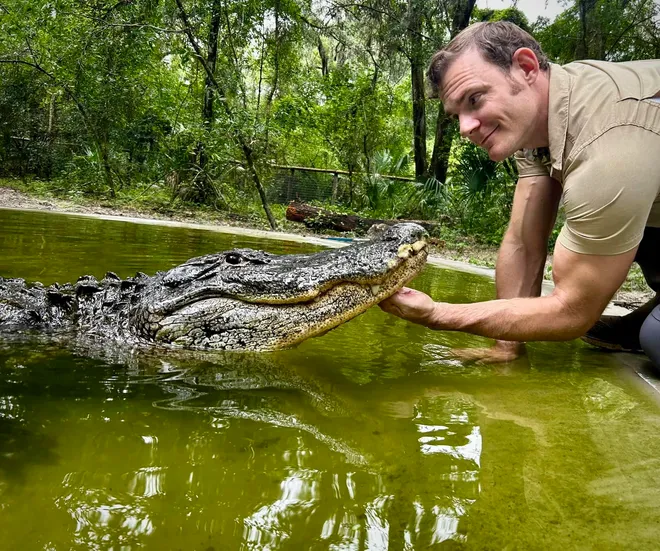“I would not go in dark water. I would be extremely cautious,” Rene Walker of Tampa Bay Rescues warned.
ST. PETERSBURG, Fla. — Florida wildlife officials are urging locals in areas affected by Hurricanes Helene and Milton to steer clear of dark floodwaters, as alligators and snakes have been spotted lurking in unusual places.
Residents returning to their homes after fleeing the storms have encountered gators inside their homes and snakes roaming the streets, swept in by the currents from Hurricane Milton. The storm made landfall as a Category 3 hurricane on October 9, hitting Siesta Key, south of Tampa Bay.
“The floodwaters displaced them from their usual habitats, and they’re simply going where the water takes them,” explained Rene Walker from Tampa Bay Rescues, an animal rescue and conservation group, in an interview with NBC News.
The Florida Fish and Wildlife Conservation Commission echoed these warnings on X, advising, “Some wildlife, such as alligators, snakes, and bears are more likely to be seen after a storm. Be aware, keep your distance, and give all wild animals space.”
Walker emphasized the need for caution. “I wouldn’t venture into dark water. Gators generally avoid people, but if someone tries to grab them, they will defend themselves,” she warned.
Jen Messer, a Tampa resident, found an unwelcome visitor in her home gym—a wandering alligator. “He took a stroll on the treadmill, got in some cardio, and then made his way under our truck,” she said.
Although they called 911, Messer and her husband managed to guide the gator back to a nearby pond. “He wasn’t thrilled and took a bite out of our broom, but we got him out safely,” Messer added.
Snakes have also been frequently spotted as they, too, have been displaced by the storm’s flooding.
Ron Magill of Zoo Miami explained that many snakes, normally hidden underground, have been forced out of their habitats due to flooding. “Just like people, they’ve been flooded out. It’s important not to surprise them, which is why I tell people to stay out of the water if possible,” he warned.
In Pascoe County, rescue team member Keith March shared that he encountered snakes in the floodwaters. “You’ll see them floating along—just the other day, we spotted a water moccasin moving down the road,” he said.
To avoid dangerous encounters with Florida’s wildlife, March advised people to avoid walking through floodwaters, be cautious around areas near wildlife reserves or ponds, and always keep pets on a leash during walks.
For those who find a gator on their property, Walker suggested, “The best approach is to secure the area without interacting with the animal and call authorities like the Florida Fish and Wildlife Conservation Commission.”
In addition to wildlife concerns, the Florida Department of Health also issued a warning ahead of Hurricane Milton about the potential risk of Vibrio, a flesh-eating bacteria found in warm coastal waters. This bacteria can infect people through open wounds, making floodwaters particularly dangerous.
Hurricane Helene brought its own set of challenges, displacing colonies of yellow jackets in western North Carolina after their underground nests were destroyed by heavy rain, floods, and fallen trees. This led to an increased risk of stings, prompting North Carolina health officials to stock up on Benadryl and EpiPens for those affected.
Helene’s impact was devastating, with the storm claiming at least 24 lives and leaving millions without power.
